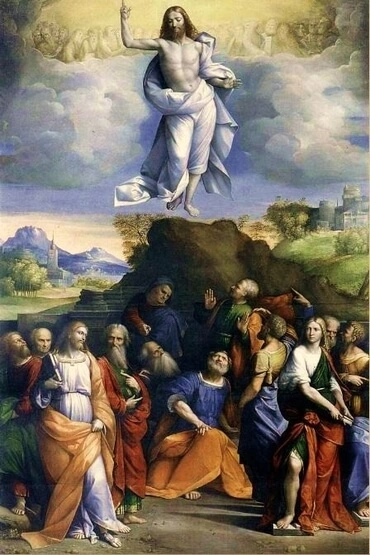Explanation of John 1:14
Durch Brian David

This is a key moment in this story. The beginning of John 1 explained that the Lord is perfect, infinite love which gave itself expression as divine truth. The duality of love and expression formed a template for humanity, which meant that the Lord’s duality made him the ultimate, divine human. It showed that the divine truth was the power of creation, and that the Lord shared that truth with humanity from the outset, so that people could receive His love and return it. But people kept turning away, and the Lord had to keep expressing his love in more and more external forms to maintain a connection.
By mentioning John the Baptist, the chapter showed that the Jews of the time still had the truth – the Lord’s Word – contained inside the rough-hewn images of the Old Testament. But they were so steeped in evil loves and false thinking that the connection to the Word – to the love within the Old Testament – was about to be snipped forever.
So the Word became flesh. The Lord passed the full expression of His love and His full humanity into physical flesh as Jesus. That way He could once again show the life within the existing Scriptures and could make His own life and His own words part of an expanded expression of truth for a new age of humanity. People could no longer see and feel the Lord’s love through the Old Testament, but they could see and feel it in the face and hands and words of Jesus.
The "glory" here expresses the blinding brilliance of that truth. The "Father" represents the Lord’s actual love itself, and being "begotten" means that the love was expressed in the form of truth. Being full of "truth" has a pretty obvious meaning, but "grace" means an affection, a love for what is true.
The Lord had to come. He had to let His humanity flow down into the flesh, into the most external of forms, because that was the only way we were going to see and embrace it.
(Verweise: A Brief Explanation of the Teachings of the New Church 117; The Apocalypse Explained 1069 [3]; The Word 20; True Christian Religion 3, 85)
De Verbo (The Word) #20
20. XX. The Word
All the holiness of the Word is in its literal sense, and there is no holiness in the spiritual sense without the literal sense. This would be like a house without a foundation, so like a house in the air. It would be like a human body with no skin, which would entirely disintegrate. All the inner parts of the body 1 are connected with the peritoneum, pleura, and skin; so is the spiritual sense with the literal sense. The spiritual sense without the literal sense would be like contents with no container, so like wine with no vessel to hold it. The spiritual with no natural is much the same, or the heaven of angels and their wisdom without the human race and the church among them, and the intelligence it derives from the literal sense. The literal sense of the Word brings about that connexion and that linking with a person. This too was the reason why the Lord came into the world. For everything in the literal sense was falsified by the Jews, to such an extent that there was no longer an ultimate stage in mankind. The Lord therefore came into the world and put on the Human, so that He might also become the Word in the literal sense, or Divine truth at its ultimate level. This is why the Word is said to have become flesh (John 1:14).
[2] It is the same with the power of Divine truth. All power in the spiritual world belongs to Divine truth proceeding from the Lord. Many expressions can be quoted to illustrate the nature of the power of Divine truth there (a number of these experiences are to be inserted). All the power of Divine truth lies in the literal sense of the Word; the spiritual sense without the literal sense has no power, but the literal sense containing the spiritual sense has. When therefore spirits bring forward anything from the literal sense, it is evident that there is communication with heaven; but not if they bring forward anything from the spiritual sense without the literal sense.
[3] Thus all responses from heaven have been and are made by means of things in the literal sense. This is why the literal sense was represented by the Urim and Thummim on Aaron's ephod; that was his outermost garment. This is why in the Book of Revelation the foundations of the New Jerusalem are listed as composed of twelve precious stones, as well as of pearls; these too meant the literal sense. Likewise the Cherubim upon the Mercy-seat; this is why Moses and Aaron received responses by that means.
[4] The arrangement adopted by the inner levels of Divine truth, the source of the wisdom of the angels; this is a simultaneous arrangement, so the literal sense is their container.
[5] All the details of the church's teaching are therefore to be supported from the literal sense of the Word, and no point of teaching which cannot be so supported has any force. A point of teaching which is supported by the literal sense as regards real truth has force. Even the appearance of Divine truth has force, though less so, as if it could agree with real truth. But if the literal sense of the Word is falsified, it has no force; it shuts off instead of opening up heaven.
Fußnoten:
1. The manuscript has 'of the Word', but this must be a slip for 'of the body'. -Translator






